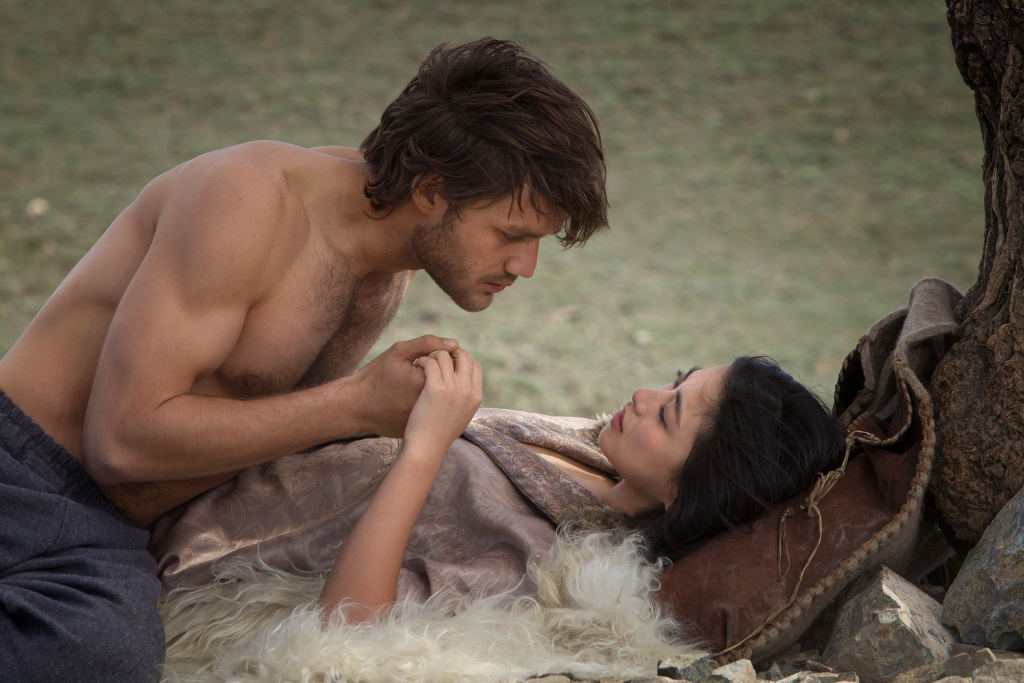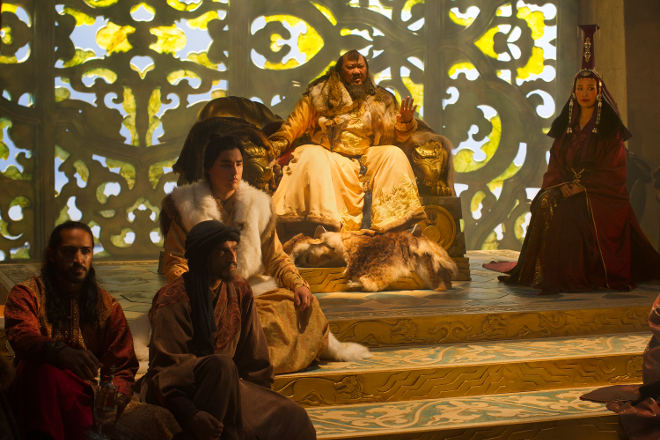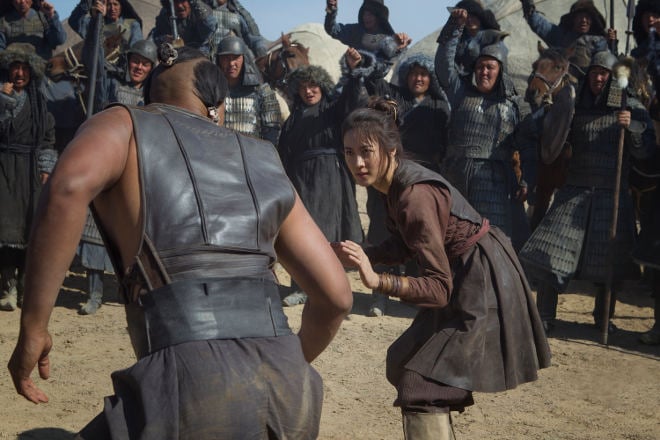‘Marco Polo’ May Be Problematic, But That Shouldn’t Stop You From Watching it
If you can get past the troubling bits, the big-budget epic tells a great story and showcases a diverse cast, including young Aussie actors in breakthrough lead roles.

Marco Polo (the guy, not the swimming pool game) was a 13th Century Italian fellow who went to China and wrote stories about it for the folks at home. Now he’s got a show on Netflix AU – a ten-hour epic starring a diverse cast (and a bunch of Australian actors), with a second season already in in production.
The show’s premise is simple: Marco (Lorenzo Richelmy) gets left in 13th Century Mongolia by his merchant father and uncle, as a tribute to Emperor Kublai Khan (the grandson of Genghis, played by Benedict Wong). Billed as a world of “greed, betrayal and sexual intrigue,” Marco Polo is a visually stunning and character-driven drama that is ultimately unlike anything we’ve seen before.
As Netflix doesn’t release its viewership data it’s unclear how many people are watching, but critics are certainly weighing in: not only about the show’s quality, but the problematic way it deals with race and gender. But are those criticisms missing the bigger picture?
–
Early reviews of Marco Polo, following the US previews at the end of 2014, weren’t particularly flattering; Forbes called it “too big”, and according to The Atlantic: “When deconstructed, Marco Polo is like a blander, trying-too-hard, real-life version of a certain HBO hit show adapted from an as-yet incomplete series of fantasy novels.”
The Game of Thrones comparisons are, frankly, pretty boring. Aside from the war games and the epic grandeur of the production values, the story told in Marco Polo is only similar in that the major players are also literally fighting over thrones. Kublai, desperate to expand his empire, has his sights set on the Song Dynasty of Southern China — but there’s much more to it than that.

L-R: Finance Minister, Ahmad (Mahesh Jadu), Vice Regent, Yusuf (Amr Waked), Prince Jingam (Remy Hii), Kublai Khan (Benedict Wong) and Empress Chabi (Joan Chen)
Remy Hii, the Australian actor who plays Kublai’s son and heir Prince Jingim, agrees; he thinks the show could be just as easily be compared to House of Cards, given the depth of the politics and power plays of Kublai’s court. “Game of Thrones has the monopoly on swords and daggers, but I don’t think those comparisons, whilst inevitable, are particularly accurate,” he says.
With all the goings on in Kublai’s royal court, which includes characters played by other homegrown stars Mahesh Jadu (finance minister Ahmad) and Uli Latukefu (Kublai’s illegitimate son and warrior Byamba), there’s more than enough drama to make up for a lack of dragons or scary ice monsters. “I used to joke around and call it House of Khans,” Hii adds. “I’m actually shopping that idea around for a potential crossover.”
Your Fave Is Problematic
Like pretty much everything that has ever existed, a lot of viewers will cringe over how Marco Polo deals with race and gender issues.
From first glance, it seems the show is going to be creepily Orientalist: the grandeur of exotic palaces and the salaciousness of Kubali’s harem seem like central, overly glorified aspects. And these aspects are certainly problematic, as has been pointed out by Zak Cheney-Rice, for Mic: “The Netflix iteration of Polo’s travels looks so steeped in Orientalist stereotypes it’s hard to stop rolling your eyes. From mysterious women flitting about shadowy doorways to what appears to be — as Angry Asian Man points out — a naked guy doing some kind of aerial kung fu move, Polo’s “greatest adventure” is so heavy on gongs, swords and silk-clad women blowing opium powder into the camera it’s a shock the soundtrack isn’t just a rehash of the ‘Asian riff‘.”
From the blind kung-fu master (Bayan the Hundred Eyes, played by Tom Wu) to the billing of Marco Polo as the driver of the series — when he’s actually just a minor character in the scheme of things — you can pretty much tick off every East-Meets-West trope in the first episode.
But given what Marco Polo does for representation and diversity on our screens, criticisms that it centres on a white-Eurocentric narrative are perhaps also a little half-baked. Even being mindful of its problematic elements, it’s hard not to see this production as a good thing for diversity on our screens. It’s portraying history that isn’t European, and, to give credit where it’s due, this must be the first time we see a show for predominantly Western audiences invest so much in a series that has what seems to be only four speaking roles for white actors.
It is rare to have a major television show that is cast predominantly with people of colour, and with the starring performances from Hii, Jadu (both Neighbours alumni) and Latukefu (previously seen in Jonah from Tonga), this show is also great for diversity in the Australian industry. There are actors here who do not look like your stereotypical Aussies, and they are doing well.
With Netflix Australia yet to rule out local productions (“We are always on the lookout for amazing talent” is their official line), these guys are great ambassadors for an Australia that has diverse and deep talent to showcase new stories that legacy studios would probably never bother with.
Through The White Man’s Lens
The big problem with any mainstream attempt to tell other cultures’ stories is that we usually only ever see it through a white lens. Marco Polo certainly plays to that pattern – but Shonda Rhimes can’t make every TV show on air, so it’s worth working with what we’ve got, in the hope it will push things further along to where we want to be.
Yes, the title character is white — but Marco Polo himself is hardly the saviour who brings civilisation to the Mongol hordes. Without revealing too much, he actually stuffs a few things up rather terribly. Plus, he’s on the receiving end of some race-based insults: Prince Jingim calls him a “round eyed rat”, while others in the court refer to him as “Latin” with such disdain that it might be the 13th Century equivalent of “cracker”.
When you look deeper, Marco Polo’s role here is actually pretty similar to Piper Chapman in another of Netflix’s notable original series: Orange is the New Black.
Like Piper, Marco is a fish out of water trapped in a world in which he doesn’t belong — and through his eyes (as through hers) we watch stories and characters we wouldn’t ordinarily see on TV. Essentially, Marco is just a narrator; even as part of an early plot line, Kublai appoints him to the role of a foreign correspondent, charged with bringing back information from the outer reaches of the empire. But we are also shown plenty that Marco himself is not privy to; ultimately he’s a minor character in a pretty grand story.
Both the New York Post and Vice have picked up on a similar point: if you ignore his personal storyline, the tales Marco Polo tells are pretty intriguing. As series creator John Fusco notes, “Very few people know that the true accounts of Marco Polo are so much more compelling and exciting than the mythology … which is rare. It’s usually the other way around.”
Gender Portrayals And Lady Bits
It’s perfectly reasonable to have no time for the harem scenes and the frankly bizarre substance-addled sex dreams – I certainly had had enough by the second episode. Gratuitous nudity abounds, although perhaps that says more about the genre of these epic adventure stories than anything else.
But the harems DID play a major part in the workings Kublai’s court at the time, and rather than solely glorifying it, we are given glimpses to how women in those times had to manage their lot. As history books like the Secret History of the Mongol Queens show, the women in the Mongolian dynasties actually played powerful and very central roles during the time, which is certainly reflected in Marco Polo.
Joan Chen, who plays politically savvy Empress Chabi, Kublai Khan’s chief wife, and Tan Kheng Hua as Xie Daoqing, empress dowager of the Song Dynasty, are brilliant in their roles. And Olivia Cheng’s Mei Lin, a courtesan who basically gets trafficked between the two warring kingdoms, is an incredibly layered role: a fierce fighter, and a loving mother.
But the standout has to be Claudia Kim’s warrior princess Khutulun, who, according to Polo’s accounts, demanded that prospective suitors wanting to marry her had to defeat her in wrestling, or forfeit horses to her if they lost. Apparently she gained 10,000 horses defeating all the dudes who tried to put a ring on it, and on the show she manages to rather enjoy herself as a single lady.
Everything we see on our screens needs to be taken with a grain of salt. Marco Polo — the historical figure, the character and the show itself — is hardly perfect. It deserves a listing on Your Fave Is Problematic, but it’s also thoroughly enjoyable TV. With a great twist in the cliff-hanger finale of the first season, all I can say is bring on the second.
–
Season one of Marco Polo is available to watch on Netflix AU.
–
Sunili is a lawyer and freelance writer/editor with interests in human rights, diversity in popular culture, and napping. She currently lives in Jakarta, and tweets from @sunili
